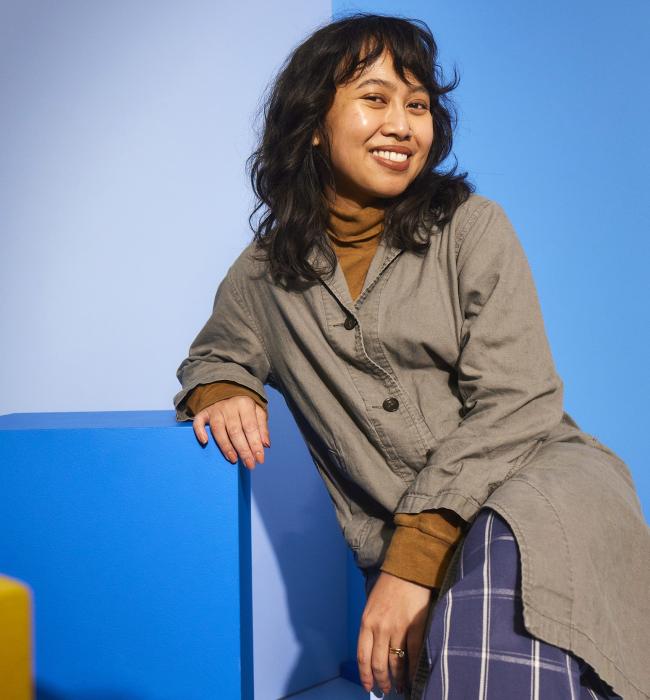
Kayla Abuda Galang
Radio-Television-Film, Journalism
Class of 2014
How are you using the skills that you learned at Moody as a filmmaker?
At Moody, I got to wear many different hats on my projects and my peers’ projects — writing, directing, shooting, editing, lighting, sound recording, stills photography, you name it. I’m not necessarily good at all these things, but trying these things out made me a better director and producer. I have so much empathy for every role on set, and my basic technical understanding of everyone’s job helps me better communicate with them! Getting to be on all these projects and working with so many people also helped me develop my values and boundaries in collaborative spaces. I know what feels good to me and what doesn’t, which counts for everything in this wild west of an industry.
Why are you interested in filmmaking, storytelling and directing?
Film has always been such a fabric of my life. I’m a romantic and a big daydreamer, and I’ve always loved the indelible ways that my favorite films have hit me. Writing and directing is like a love language for me, and I get to speak to my friends, family, and communities through film.
Briefly tell me about your film "When You Left Me on that Boulevard." What's the inspiration behind it? How many awards has it won?
The inspiration stems from the experience of having a huge, all-consuming crush as a teenager and having to stifle it in big, sometimes suffocating family settings. I regard that experience with a lot of humor and gratitude. I’m really happy to see the response it’s gotten on the festival circuit — it won the Short Film Grand Jury Prize at Sundance Film Festival and the Special Jury Award for Vision at SXSW Film & TV Festival!
What have you learned so far from being a filmmaker?
Honestly, no one really knows what they’re doing and there is no simple answer to anything. I’ve heard these exact words from respected producers and development executives. I don’t know how comforting that is to anyone reading this, but I can say it comforts me in times of self-doubt. It also gives me the permission to forge my path in ways that genuinely feel right to me.
What advice do you have for #TEXASMoody students?
Find your people who get you and know what you’re about so they can support you and challenge you when you need it. The creative path can be frustrating, dizzying, and isolating, so it’s good to be backed by people who can pull you out of those kinds of holes.
What do you miss most about Moody College?
I really miss the easier access to equipment and studio resources, haha. Filmmaking is so expensive.
Find your people who get you and know what you’re about so they can support you and challenge you when you need it. The creative path can be frustrating, dizzying, and isolating, so it’s good to be backed by people who can pull you out of those kinds of holes.
Can you talk about your career path?
My career path has been pretty twisty and windy! Since graduating in 2014, I’ve been worn many hats over the years. I’ve worked as a freelance video editor, community manager, wedding photographer, and graphic designer. All these gigs were adjacent to filmmaking in some way, and I’m grateful that I have those experiences under my belt. It wasn’t until the pandemic that I thought to direct another film — mostly because I figured the world was ending and I might as well take some big swings. I’m glad to say those big swings paid off. And I’m glad to say that my varied professional experience in my 20s led to my becoming a producer at Liberal Arts ITS.
What classes/professors helped the most?
I loved Narrative Production with Nancy Schiesari, Documentary Production with Heather Courtney, and Undergraduate Thesis with Richard Lewis. In Narrative Production, Nancy advocated for the meekest of us and really championed story over bells and whistles. In Documentary Production, Heather really showed us how to move through the filmmaking process from top to bottom with flexibility and grit. And in Undergraduate Thesis, Richard fostered collaboration and allowed me to meet some of my forever film friends I still work with today.
What's next for you?
I’m developing a couple of feature films based in San Diego and Houston — both stemming from experiences of girlhood and family. One of those projects is supported by the Sundance Institute via the Producers Intensive — shouts out to RTF alums Samantha Skinner and Alifya Ali on making it in!
